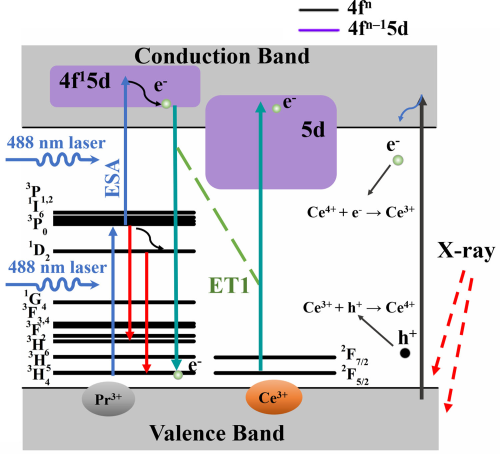Visible luminescence of Pr3+ ions doped materials, has found various applications in medical treatment, visible light communication, and display techniques. Unfortunately, Pr3+ ions doped oxide glass fibers suffer from photo-darkening under blue laser pumping, which affects their visible laser performance.
Most recently, a research team led by Shanghai Institute of Optics and Fine Mechanics, Chinese Academy of Sciences, has succeeded in suppressing the photo-darkening of Pr3+ ions by introducing Ce3+ ions in silicate glasses. The study was published in Journal of the American Ceramic Society on Jan. 7, 2022.
In their experiment, Pr3+/Ce3+ co-doped silicate glass fiber was synthesized as a function of Ce3+ ions concentration by mature processing techniques. The absorption, emission spectra, and fluorescence lifetimes of Pr3+, as well as the energy transfer mechanisms, were characterized and investigated.
They found that the photodarkening effect of Pr3+ in silicate fibers is efficiently inhibited by energy transfer with Ce3+ ions. The visible emission intensity of Pr3+/Ce3+ co-doped silicate glass fiber is maintained at 93.3% of the initial value after the radiation of the 486 nm laser for 30 min.
Moreover, the hole centers and the electron centers are trapped by Ce4+ and Ce3+ ions respectively, which strengthens the radiation resistance of glass fibers.
This research may lead to a host material for fiber laser operated at visible wavelength.

Energy transfer between Pr3+ and Ce3+ in silicate glasses. (Image by SIOM)
Article website:
https://ceramics.onlinelibrary.wiley.com/doi/10.1111/jace.18318
Contact:
WU Xiufeng
General Administrative Office
Shanghai Institute of Optics and Fine Mechanics, CAS
Email: xfwu@siom.ac.cn
Web: http://english.siom.cas.cn/